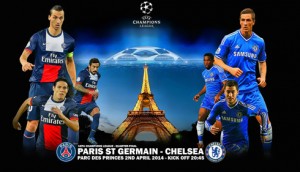Chelsea vs. Saint Germain: The setting for today’s blog is the Paris Metro and the event that seemingly precipitated the following incident was the aftermath of a football match between a French team, Saint Germain vs the English club, Chelsea. However, this isn’t a sports story. It is a story about ugliness and intolerance.

Chelsea vs. St. Germain.
In the train station, a black man was physically stopped from getting on the Paris Metro. It was not gentle kidding; he was physically pushed not once, but at least three times. As the man was shoved off the train, the crowd shouted racist chants.
If this were not offensive enough, a strange fact has just surfaced. In an online article for CNN (February 23, 2015) entitled: “Human rights official identified as one of fans involved in Chelsea race storm,” we are made aware of the possible involvement of a man by the name of Richard Barklie.
Barklie is described as a “human rights official.” He was on the Metro car. The article states:
“Richard Barklie was one of three men identified by the UK’s Metropolitan Police in a video showing what appears to be a group of Chelsea fans preventing a black man from entering a train, following the English club’s UEFA Champions League game against Paris last Tuesday.”
He was apparently one of the passengers who witnessed others yelling: “We’re racist, we’re racist and that’s the way we like it.”
Denial – and so what?
Barklie is a former police officer and apparently a director at the World Human Rights Forum. He has admitted being on the train but denies chanting racist comments or physically blocking the man. Barklie claims he hates racism and that he would never participate in such an act. The surveillance cameras in the station captured Barklie’s image as being one of the men at the door of the train.
“Barklie offered his ‘sincerest apologies for the trauma and stress suffered by Mr. Souleymane’ [the passenger] while saying he ‘has an account to give to police which will explain the context and circumstances’ of the incident.”
The Chelsea football club issued profuse apologies and strongly condemned the racist incident. They have expressed shame and disgust at such behavior. Chelsea has apparently identified five other “fans” from the surveillance video and those fans have been banned. We don’t know for how long.
I must credit other Chelsea fans with stepping up for what was right; there was apparently a display of anti-racist banners at the next Chelsea home game and the victimized fan was invited into the equivalent of the owner’s box courtesy of the team.
Still…
The behavior of English soccer hooligans is legendary. Home or away, their conduct is intolerable and uncivilized. I must be quick to point out the usual; it is a small percentage of the fans and by no means is representative. Yet I cannot help but wonder how the level of tolerance toward that percentage grew so steadily and for so long a time that such behavior has been allowed to fester.
Mr. Barklie offers us valuable insights.
Leaving football altogether
In our own everyday lives, what do we witness and what do we tolerate? I speak on ethics to groups across the country and I have learned to carefully listen and observe. Sometimes I hear intolerance wrapped in very politically correct language; sometimes I hear intolerance in more blatant forms.
Suppose Barklie were not a football fan riding in a train, but the CEO of an American organization where a board member issued forth a racist or anti-Semitic remark – and he did nothing? Suppose Barklie was in HR and was present at an industry get-together where the liquor was flowing freely and someone issued a homophobic or bullying remark – and he simply stood there and laughed at the comment?
I understand the fears involved. I also understand what the result is when “good” people do nothing. If it is true that Barklie is involved in human rights, could he not have reported the incident to someone? I understand that there is a lot of fear involved. For an “older man” to confront an angry group of drunks is a frightening thing.
However, I then ask myself some other ethical “what if” type questions. What if the car was jammed with “decent people,” and there were only three or four racist hooligans? Could those on the car not acted or said something?
I would assume the train was not the last train leaving the station that day. What if, minimally, Barklie had gotten off the train, walked up to the man and said:
“I apologize for those morons. I don’t want to be seen with them either. Here, let me stand with you until the next train.”
Instead, he rode on, waiting for the police to identify his smiling face.Ch

